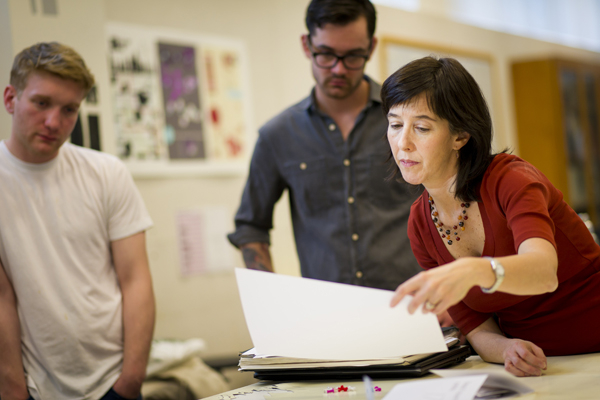Mason Gross Launches New MFA in Design
Program to delve into design as a catalyst for social change

The Department of Art and Design at the Mason Gross School of the Arts is set to launch a new Master of Fine Arts in Design that will build on collaborations throughout the university to lay a foundation for a new generation of entrepreneurship.
The two-year, 60-credit program will welcome its first cohort in fall 2019.
Art and Design faculty Jacqueline Thaw serves as director of the new program. She says the department established the degree with an eye toward designers who are passionate about initiating their own ventures – those who wish not only to respond to and execute ideas but to formulate them and marshal them for a wider purpose.
“Today, designers are more speculative and entrepreneurial,” Thaw says, and the MFA in Design is meant to “nurture skills in initiating, developing and executing self-driven projects, preparing designers to lead creative initiatives, whether they go on to do this independently or as part of a company or organization.”
In addition, Thaw says, the degree will steep students in research and design history and will embrace a wide range of subject matter, as designers collaborate on ambitious projects with clients and partners in the sciences, social sciences and the humanities. Students will initiate design collaborations within the university and beyond.
The undergraduate design program, launched in fall 2015, has already embraced multiple collaborative projects at Rutgers, with landscape architecture, the Department of French, and biomedical engineering, among others, with the idea that design should actively respond to real-world issues.
For their collaboration with the Department of Biomedical Engineering, BFA design students created a digital app/game that could assist specialists with autism detection.
“While children played a game, this app would track various body movements, and this information is helpful in diagnosing autism,” says faculty Atif Akin, who developed the degree along with Thaw and current department head Gerry Beegan.
So, “design” in this case doesn’t just reference the technical aspects of crafting a website, Thaw says. In addition to coding, students will wrestle with gathering and delivering information to audiences in an accessible manner, via multiple formats –among them, books, websites, magazines, mobile apps, online publications, exhibitions, apparel, installations, data visualizations, wearable objects, furniture and projections.
An interdisciplinary focus makes sense, Thaw adds, because design is “outward looking; designers develop projects in response to real-world contexts. Also, design is inherently collaborative.”
According to Akin, Rutgers provides fertile ground for the program.
“A major research university like Rutgers offers access to information that relates to a wide range of disciplines and data in various forms,” he says.
In 2017, Art and Design student Jocelyn Orante (BFA ’18) was part of a group of design students who collaborated with the Department of French to produce a website and posters for the Poésies-Politiques/Poetries-Politics colloquium and exhibition. She now works at a small design agency in New York City.
“The project made us realize that people around the university are doing really cool work ,’’ Orante said. “Design opens your mind. No one has ownership over an idea – it’s not just one person’s vision. It’s cool to see how that vision takes shape. Collaboration challenges your beliefs and preconceived notions. It opens an avenue to something you didn’t expect, and when you work with non-designers on projects, it’s an amazing thing to hear their approach.”
This open-minded approach is precisely what Thaw says she hopes the Design MFA students will bring to every project.
“Designers need a combination of empathy and imagination,” Thaw says. “They need to be able to imagine others’ contexts and care for others’ perspectives.”
Applications are being accepted through January 25; portfolios are due February 1. Read more about the program here.